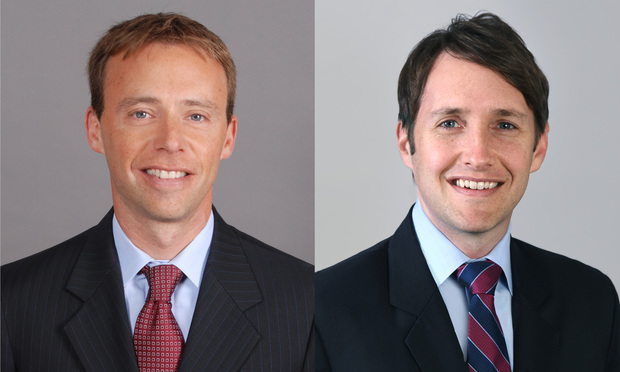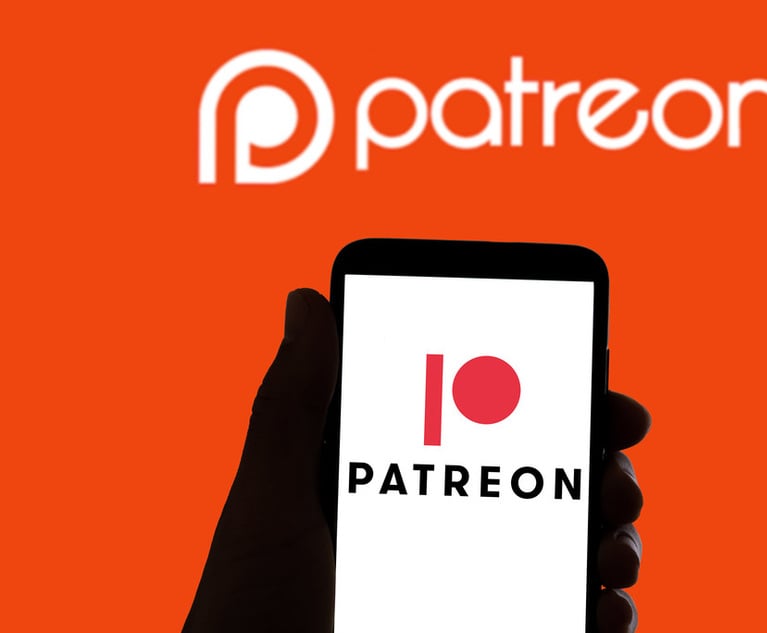Gig-Worker Classification in the Age of COVID-19
Gig workers, like other Americans, are feeling the strain of the COVID-19 health crisis and economic slowdown, and gig-economy companies should do all they can to help the workers through these trying times.
April 03, 2020 at 05:52 PM
5 minute read
 Joshua S. Lipshutz,left, and Michael Holecek,right, of Gibson, Dunn & Crutcher.
Joshua S. Lipshutz,left, and Michael Holecek,right, of Gibson, Dunn & Crutcher.
In the face of the COVID-19 crisis, gig-economy companies have adapted quickly to Americans' changing needs. Uber announced this week that it is launching a grocery-delivery service. Rideshare competitors Didi and Pronto similarly announced last week that they had created grocery-shopping platforms. And Lyft recently reported that it was piloting restaurant and medical-supply delivery platforms.
These rapid shifts demonstrate what Silicon Valley investors have long known: that gig-economy companies—whatever their particular focus—are fundamentally technology platforms, uniquely designed to connect people who need various goods and services with people who can provide them. To think of these companies as merely "transportation" or "food delivery" companies is to misunderstand their business models and underestimate their capabilities.
This proper conceptualization of gig-economy companies as technology companies has important implications under California's recently enacted labor law, Assembly Bill 5 (AB 5). Under AB 5, workers must be classified as employees and not independent contractors unless they "perform work that is outside the usual course of the hiring entity's business." Cal. Labor Code §2750.3(a)(1)(B).
For that reason, when AB 5 was enacted, many politicians and commentators—including Governor Newsom and bill sponsor Assemblywoman Lorena Gonzalez—declared it the end of the gig-economy business model, in which workers using the platforms are typically treated as independent contractors. Just last week, the City of San Francisco echoed that view, calling on the State's district attorneys to force gig-economy companies to "comply" with AB 5 by reclassifying gig workers as employees.
But AB 5 did not order the reclassification of gig workers. Rather, AB 5 codified an independent-contractor test—called the "ABC test"—that has been around for many years in several states. And, as the COVID-19 crisis has helped demonstrate, all three factors of the test favor treating gig workers as independent contractors.
Prong A asks whether the worker is "free from the control and direction of the hiring entity in connection with the performance of the work." Of course, few workers have as much freedom and flexibility as gig workers. Gig companies generally do not require workers to be available at any particular times, show up in any particular place, or accept any particular work. With coronavirus depressing demand for traditional rideshare in certain areas, gig workers have complete autonomy to shift to other platforms offering new opportunities, such as grocery shopping or medical-supply delivery. A traditional employee could never make those types of choices because the company would decide how to redeploy resources in top-down fashion.
Prong B, as mentioned above, asks whether the worker and the company are engaged in the same "course of … business." Recent events prove more than ever that, in the gig economy, they are not. A rideshare driver might consider herself to be in the transportation business, but the company that operates that rideshare platform likely also operates platforms for grocery shopping, restaurant delivery, catering, long-haul freight, non-emergency medical transport, and/or "virtual kitchens"—all types of virtual marketplaces that connect people, products, and services. That is because, as the U.S. Department of Labor has correctly concluded, these companies are technology companies: "the business's 'primary purpose' is not to provide services to end-market consumers, but to provide a referral system that connects service providers with consumers." Their employees are the software engineers writing the code that runs their platforms, not the people who use their apps.
Prong C asks whether the worker is "engaged in an independently established trade, occupation, or business." Again, the ongoing health crisis confirms that gig workers are independent business owners—entrepreneurs who seek to earn money by providing a variety of services on numerous platforms, wherever the right opportunity arises. During the recent debates over the COVID-19 economic stimulus bill, many legislators and commentators addressed gig-economy work as a unique occupation, and the CARES Act even makes small business loans available to gig workers, recognizing them as operators of independently established business.
Of course, gig workers, like other Americans, are feeling the strain of the COVID-19 health crisis and economic slowdown, and gig-economy companies should do all they can to help the workers through these trying times. But no gig worker will lose his or her job because of the crisis—not in any traditional sense. Rather, when the demand for rideshare and other services returns, they will be able to provide their services by clicking on the app, just as they did before. That is the hallmark of an independent contractor.
Joshua S. Lipshutz and Michael Holecek are partners at Gibson, Dunn & Crutcher and represent several gig-economy companies in misclassification litigation around the country.
NOT FOR REPRINT
© 2025 ALM Global, LLC, All Rights Reserved. Request academic re-use from www.copyright.com. All other uses, submit a request to [email protected]. For more information visit Asset & Logo Licensing.
You Might Like
View All
'A Death Sentence for TikTok'?: Litigators and Experts Weigh Impact of Potential Ban on Creators and Data Privacy

‘Extremely Disturbing’: AI Firms Face Class Action by ‘Taskers’ Exposed to Traumatic Content
5 minute read

Patreon Hit With Lawsuit for Allegedly Diverting Subscriber Data to Meta
Law Firms Mentioned
Trending Stories
- 1South Florida Attorney Charged With Aggravated Battery After Incident in Prime Rib Line
- 2'A Death Sentence for TikTok'?: Litigators and Experts Weigh Impact of Potential Ban on Creators and Data Privacy
- 3Bribery Case Against Former Lt. Gov. Brian Benjamin Is Dropped
- 4‘Extremely Disturbing’: AI Firms Face Class Action by ‘Taskers’ Exposed to Traumatic Content
- 5State Appeals Court Revives BraunHagey Lawsuit Alleging $4.2M Unlawful Wire to China
Who Got The Work
J. Brugh Lower of Gibbons has entered an appearance for industrial equipment supplier Devco Corporation in a pending trademark infringement lawsuit. The suit, accusing the defendant of selling knock-off Graco products, was filed Dec. 18 in New Jersey District Court by Rivkin Radler on behalf of Graco Inc. and Graco Minnesota. The case, assigned to U.S. District Judge Zahid N. Quraishi, is 3:24-cv-11294, Graco Inc. et al v. Devco Corporation.
Who Got The Work
Rebecca Maller-Stein and Kent A. Yalowitz of Arnold & Porter Kaye Scholer have entered their appearances for Hanaco Venture Capital and its executives, Lior Prosor and David Frankel, in a pending securities lawsuit. The action, filed on Dec. 24 in New York Southern District Court by Zell, Aron & Co. on behalf of Goldeneye Advisors, accuses the defendants of negligently and fraudulently managing the plaintiff's $1 million investment. The case, assigned to U.S. District Judge Vernon S. Broderick, is 1:24-cv-09918, Goldeneye Advisors, LLC v. Hanaco Venture Capital, Ltd. et al.
Who Got The Work
Attorneys from A&O Shearman has stepped in as defense counsel for Toronto-Dominion Bank and other defendants in a pending securities class action. The suit, filed Dec. 11 in New York Southern District Court by Bleichmar Fonti & Auld, accuses the defendants of concealing the bank's 'pervasive' deficiencies in regards to its compliance with the Bank Secrecy Act and the quality of its anti-money laundering controls. The case, assigned to U.S. District Judge Arun Subramanian, is 1:24-cv-09445, Gonzalez v. The Toronto-Dominion Bank et al.
Who Got The Work
Crown Castle International, a Pennsylvania company providing shared communications infrastructure, has turned to Luke D. Wolf of Gordon Rees Scully Mansukhani to fend off a pending breach-of-contract lawsuit. The court action, filed Nov. 25 in Michigan Eastern District Court by Hooper Hathaway PC on behalf of The Town Residences LLC, accuses Crown Castle of failing to transfer approximately $30,000 in utility payments from T-Mobile in breach of a roof-top lease and assignment agreement. The case, assigned to U.S. District Judge Susan K. Declercq, is 2:24-cv-13131, The Town Residences LLC v. T-Mobile US, Inc. et al.
Who Got The Work
Wilfred P. Coronato and Daniel M. Schwartz of McCarter & English have stepped in as defense counsel to Electrolux Home Products Inc. in a pending product liability lawsuit. The court action, filed Nov. 26 in New York Eastern District Court by Poulos Lopiccolo PC and Nagel Rice LLP on behalf of David Stern, alleges that the defendant's refrigerators’ drawers and shelving repeatedly break and fall apart within months after purchase. The case, assigned to U.S. District Judge Joan M. Azrack, is 2:24-cv-08204, Stern v. Electrolux Home Products, Inc.
Featured Firms
Law Offices of Gary Martin Hays & Associates, P.C.
(470) 294-1674
Law Offices of Mark E. Salomone
(857) 444-6468
Smith & Hassler
(713) 739-1250






